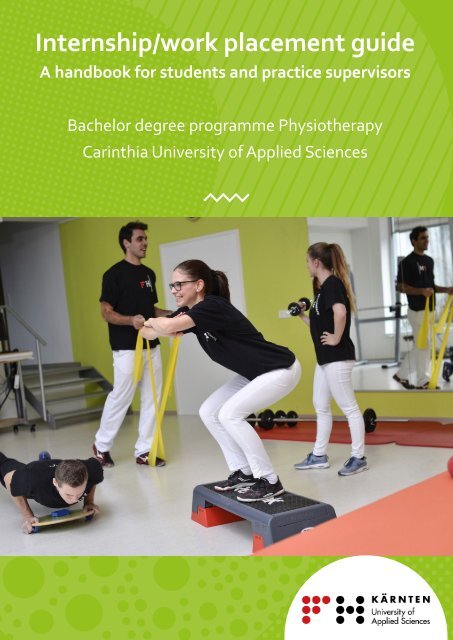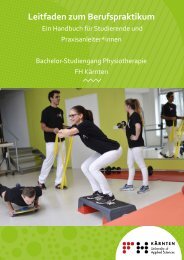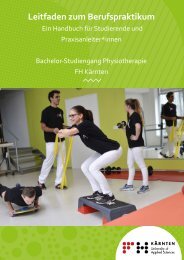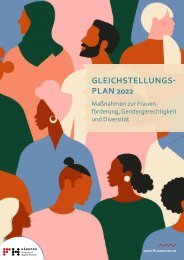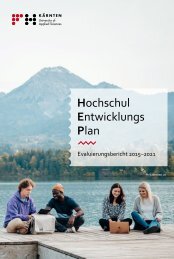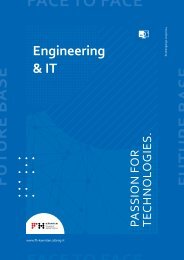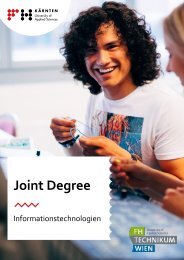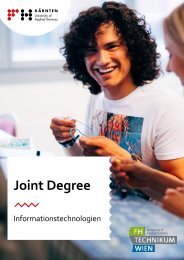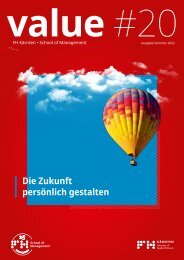Internship/work placement guide
Physiotherapy
Physiotherapy
Create successful ePaper yourself
Turn your PDF publications into a flip-book with our unique Google optimized e-Paper software.
<strong>Internship</strong>/<strong>work</strong> <strong>placement</strong> <strong>guide</strong><br />
A handbook for students and practice supervisors<br />
Bachelor degree programme Physiotherapy<br />
Carinthia University of Applied Sciences<br />
1
Table of contents<br />
1 Goals of the professional internship<br />
1.1 Acquisition of competences<br />
1.2 Professional role<br />
1.3 Reflective competence<br />
2 Organisation and duration of <strong>work</strong> <strong>placement</strong>s<br />
2.1 Professional internship phases<br />
2.2 Scope of the professional internships and position in the curriculum<br />
2.3 Voluntary <strong>work</strong> <strong>placement</strong>s and professional internships abroad<br />
2.4 Liability position of students<br />
3 Guidelines for student professional internships<br />
3.1 Organisation of the <strong>work</strong> <strong>placement</strong><br />
3.1.1 Confirmation of professional internship and approval by the degree programme<br />
3.2 Tasks and obligations of the Students in the within of the Professional internships<br />
3.2.1 Practical reflection in the „Seminar on the Professional <strong>Internship</strong>“<br />
3.2.2 Written feedback from the student on the professional internship<br />
3.2.3 Documentation requirements<br />
3.2.4 Hygiene <strong>guide</strong>lines and institutional regulations<br />
3.3 Absences from <strong>work</strong> experience<br />
3.3.1 Sick leave<br />
3.3.2 Other Abscences<br />
3.3.3 Documentation of abscences<br />
3.4 Failure to attend the professional internship<br />
3.5 Change of professional internship position<br />
3.5.1 Change during the professional internship<br />
3.5.2 Change before the start of the professional internship<br />
3.6 Assessment of the <strong>work</strong> <strong>placement</strong><br />
3.7 Repeating a professional internship<br />
3.8 Dress codes during a professional internship<br />
3.9 General recommendations for the professional internship<br />
3.10 Technical and organisational support of the study programme within the frame<strong>work</strong> of the <strong>work</strong> <strong>placement</strong>s<br />
4 General requirements for the professional internship position<br />
4.1 Support service<br />
4.2 Activities of the internship supervisors within the frame<strong>work</strong> of professional internship supervision<br />
4.2.1 Organisation<br />
4.2.2 Acquisition of competences<br />
4.2.3 Professional internship assessment<br />
4.2.4 Negative assessment of the internship<br />
5 Education overview<br />
6 Appendix<br />
7 Legal provisions on the professional internship<br />
7.1 Competences<br />
7.1.1 Professional-methodical competences of the physiotherapist (Annex 1)<br />
7.1.2 Social-communicative competences and personal competences (Annex 8)<br />
7.2 Minimum requirements for training<br />
7.3 Design of the training<br />
7.4 Minimum requirements for the professional internship <strong>guide</strong><br />
7.5 Minimum requirements at the practical Training of the physiotherapist (Annex 10)<br />
Assessment sheet for practical training<br />
5<br />
5<br />
6<br />
6<br />
6<br />
6<br />
7<br />
7<br />
7<br />
8<br />
8<br />
9<br />
12<br />
12<br />
12<br />
12<br />
13<br />
13<br />
13<br />
13<br />
14<br />
14<br />
14<br />
14<br />
14<br />
14<br />
14<br />
14<br />
14<br />
15<br />
17<br />
17<br />
17<br />
17<br />
18<br />
18<br />
18<br />
19<br />
24<br />
24<br />
24<br />
25<br />
26<br />
26<br />
26<br />
27<br />
27<br />
29<br />
2
3
Foreword<br />
Dear students! Dear internship supervisors!<br />
The professional internship is intended to support practice-based professional training<br />
at university level and represents an integrated and essential component of the degree<br />
programme. As the most intensive form of integration of students in the field of activity<br />
and in the operational process of the health care facilities, a high value is therefore placed<br />
on the professional internship.<br />
This „Intership/<strong>work</strong> <strong>placement</strong> <strong>guide</strong>“ is intended to serve as an „instruction manual“ for<br />
students and internship supervisors in the various <strong>work</strong> situations and to be useful in dealing<br />
with professional, practical and organisational tasks at the internship sites.<br />
If you have any further questions about <strong>work</strong> <strong>placement</strong>s or need assistance, we will be<br />
happy to help you (by e-mail, in person or by appointment).<br />
We wish you successful <strong>work</strong> <strong>placement</strong>s!<br />
Your programme director Dr Michael Suppanz, MSc & team<br />
Klagenfurt, October 2021<br />
4
1 Goals of the professional internship<br />
The aim of the professional internships is to ensure the acquisition of competence according to FH-MTD-AV Annexes<br />
1, 8 and 10 for the independent execution of all physiotherapeutic measures according to §2 Para.1 MTD Act (see<br />
Annex).<br />
1.1 Acquisition of competences<br />
In order to promote the students‘ professional-methodical as well as social-communicative and personal competences<br />
in the various internships, the following measures should be taken for each internship - depending on the student‘s<br />
level of education and subject area<br />
• Learning objectives are developed and formulated for an effective learning process<br />
• the students increasingly gain independence and responsibility in the various <strong>work</strong> <strong>placement</strong>s<br />
can attain.<br />
1.2 Professional role<br />
EXPERT<br />
PROFESSIONAL<br />
COMMUNICATOR<br />
PHYSIOTHERAPIST<br />
INNOVATORS<br />
TEAMWORKER<br />
HEALTH-PROMOTING<br />
MANAGER<br />
Within the physiotherapeutic competence profile, partial competences are defined depending on the professional role,<br />
which are to be developed and trained at Bachelor level (1st study cycle, level 6 of the EQF levels) within the frame<strong>work</strong><br />
of the study programme. According to Eckler et al. (2017) and Becker (2019), the physiotherapeutic professional roles<br />
are therefore those of:<br />
• Expert,<br />
• Communicator,<br />
• Team <strong>work</strong>er,<br />
• Manager,<br />
• Health promoter,<br />
• Innovator and<br />
• Professional.<br />
In the role of the expert, physiotherapists lead the profession-specific activities. In the healthcare system, they are<br />
responsible for assuming professional leadership in the occupational field and for making appropriate decisions<br />
and assessments. Physiotherapists are experts in function, movement and mobility of the human body, use the ICF<br />
classification for their assessment and follow the action structure of the physiotherapeutic process. (Eckler et al., 2017;<br />
Becker, 2019).<br />
5
In their role as communicators, they facilitate trusting, professional relationships in their environment (e.g. with clients,<br />
patients, families, service providers or other interest groups) and pass on information in a targeted and appropriate<br />
manner. (Eckler et al., 2017; Becker, 2019).<br />
In the role of team <strong>work</strong>ers, physical therapists actively and effectively participate in interdisciplinary and<br />
interprofessional health and social care teams. Physiotherapists <strong>work</strong> collaboratively and effectively to promote their<br />
own therapeutic practice with the aim of providing optimal care for patients and clients. (Eckler et al., 2017; Becker,<br />
2019).<br />
In the role of manager, they assume professional responsibility, contribute to the effectiveness of organisations<br />
and develop their professional career (taking into account their own resources). Physiotherapists take responsibility<br />
for planning, organising, prioritising, implementing and evaluating the <strong>work</strong> process, taking into account available<br />
resources, with the aim of ensuring a safe, effective and sustainable service. (Eckler et al., 2017; Becker, 2019).<br />
In the role of health promoters, physiotherapists use their knowledge, expertise, skills, abilities and influence to<br />
prevent illness and injury and to promote the health and quality of life of individuals and society as a whole. (Eckler et<br />
al., 2017; Becker, 2019).<br />
In the role of innovators, physiotherapists engage in lifelong learning based on (self-)reflection in practice. They<br />
ensure personal development as well as the development, transfer and application of evidence-based knowledge in<br />
the context of intra-, multi-professional and interdisciplinary issues. In this way, treatment results are to be further<br />
improved and the quality of education of future physiotherapists is to be continuously promoted. (Eckler et al., 2017;<br />
Becker, 2019).<br />
In their role as professionals, physiotherapists are committed to health and quality of life of individuals (including<br />
themselves) and society. They are committed to ethics, societal and professional value systems. As autonomous selfregulated<br />
professionals, physiotherapists strive to act in the best interests of individuals and society, to maintain high<br />
standards of conduct and to contribute to the development of the profession (Eckler et al.,2017; Becker, 2019).<br />
1.3 Reflection competence<br />
Students should regularly reflect and evaluate learning processes in order to increase personal and professional<br />
judgement. The reflective competence shall<br />
• in the professional internships, as well as<br />
• be carried out and promoted continuously in the courses „Seminar on Professional <strong>Internship</strong> 1-5“.<br />
2 Organisation and duration of the <strong>work</strong> <strong>placement</strong>s<br />
The professional internships are to be completed in the 2nd, 3rd, 4th, 5th and 6th semesters during the lecture-free<br />
period (see curriculum). The total extent of the professional internships within the 6 semesters is 44.5 ECTS. The<br />
professional internship periods in the respective professional internships are to be completed by the respective student<br />
within the frame<strong>work</strong> of a full-time <strong>work</strong>ing week. Absences during the professional internships must be made up.<br />
2.1 Professional internship phases<br />
• 2nd semester: from July of the summer semester for the duration of 4 weeks<br />
• 3rd semester: at the end of the winter semester (January/February) for a period of 5 weeks<br />
• 4th semester: from July of the summer semester for the duration of 6 weeks<br />
• 5th semester: after the end of the Christmas holidays until the beginning of the summer semester for a period<br />
of 8 weeks.<br />
• 6th semester: from mid-April to the end of June of the summer semester for a period of 10 weeks.<br />
6
2.2 Scope of the professional internships and position in the curriculum<br />
The professional internships of the Bachelor‘s degree programme „Physiotherapy“ at the Carinthian University<br />
of Applied Sciences take place continuously from the 2nd semester onwards, whereby the professional internship<br />
periods increase continuously as the degree programme progresses:<br />
2.3 Voluntary <strong>work</strong> <strong>placement</strong>s and professional internships abroad<br />
Voluntary <strong>work</strong> <strong>placement</strong>s must be applied for in writing to the head of the degree programme or the <strong>work</strong> <strong>placement</strong><br />
coordinator. Information on how to prepare an application can be found in the Moodle course on Professional<br />
<strong>Internship</strong> 1-5. In semesters 5 and 6, students have the opportunity to complete a professional internship abroad.<br />
Erasmus+ funding can be applied for professional internships in the EU area. Further information can be obtained<br />
from the International Office of the Carinthia University of Applied Sciences or the respective location coordinator (see<br />
Intranet).<br />
2.4 Liability position of students<br />
During their compulsory professional internships and any voluntary <strong>work</strong> <strong>placement</strong>s which require approval, students<br />
are legally insured against accidents and liability through their membership in the Austrian Student Union (ÖH). These<br />
internships and <strong>work</strong> <strong>placement</strong>s are anchored in the curriculum and within the frame<strong>work</strong> of their studies.<br />
7
3 Guidelines for student professional internships<br />
3.1 Organisation of the <strong>work</strong> <strong>placement</strong><br />
The students undertake to organise suitable professional internships on their own responsibility. An appropriate lead<br />
time must be taken into account. Experience has shown that some institutions require up to one year‘s advance notice<br />
for professional internships.<br />
A list of the professional internship positions available in Carinthia can be found on moodle. Within these positions<br />
or comparable positions in all provinces of Austria, students are free to choose, according to their educational level,<br />
which professional internship position they want to take up in the respective semester and also apply for it on their<br />
own responsibility. For this purpose, the form „Zusage - BP“ has to be used (see moodle).<br />
The professional internships for the Gailtalklinik and for the Tobelbad Rehabilitation Clinic are provided by the<br />
<strong>Internship</strong> coordinator (see moodle). Thus, no application by the students is required.<br />
Criteria for the selection of suitable professional internships<br />
The professional internships are to take place predominantly in hospitals. In total, the following compulsory areas<br />
have to be completed and a total of 20 PT processes have to be documented. An overview of the subject areas to be<br />
completed is shown below.<br />
In the 5th or 6th semester, the completion of a professional internship with a freelance physiotherapist can be approved<br />
in individual cases and after prior consultation with the course director/internship coordinator. A <strong>placement</strong> duration<br />
of 4 weeks is recommended.<br />
The following points should be considered when looking for a professional internship:<br />
• the respective institution meets the minimum requirements for a professional internship<br />
• the respective institution corresponds to the current state of education<br />
8
• A division of the professional internships is possible, provided that a minimum duration of 4 weeks per<br />
professional internship is observed (from BP 4).<br />
• Within an institution, the departments can be changed after 2 weeks at the earliest<br />
• A professional internship in the department of neurology is possible from the 3rd semester and from the 4th<br />
semester onwards recommended (exception: paraplegia only from the 4th semester)<br />
• A professional internship two or more times at the same professional internship location is not approved<br />
-exception: institutions/hospitals with different specialist departments (e.g. Klagenfurt Hospital as a specialist<br />
hospital)<br />
• Diversity must be taken into account - within the frame<strong>work</strong> of the professional internships, all subject areas<br />
from the compulsory areas must be covered according to the specifications:<br />
The distribution of hours in the respective compulsory areas should be based on the following table:<br />
3.1.1 Confirmation of professional internship and approval by the degree programme<br />
After receiving a place for the respective professional internship, the „Confirmation - BP“ in the form of a .pdf document<br />
is to be uploaded to actions by the stated deadline at the latest.<br />
The commitments must be applied for or uploaded to actions by the respective deadline.<br />
2nd and 4th semester:<br />
3rd and 5th semester:<br />
6th semester:<br />
by 31.01. of the year<br />
by 15.06. of the previous year<br />
until 15.10. of the previous year<br />
If the submission deadline is not met, the respective professional internship will not be approved. After the deadline,<br />
the internship coordinator will check and approve the internship confirmation forms. An internship may only be started<br />
after approval by the degree programme.<br />
9
10
11
3.2 Tasks and obligations of the Students in the within of the<br />
Professional internships<br />
In general, students in the professional internship have the obligation<br />
• to take advantage of the training opportunities offered<br />
• to conscientiously carry out the assigned activities and follow the instructions of those authorised to issue<br />
directives and to comply with the respective institute regulations (e.g. hygiene regulations).<br />
Within the frame<strong>work</strong> of the professional internships, the tasks and activities of the students relate to the following:<br />
• Practical reflection in the „Seminar on Professional <strong>Internship</strong>“<br />
• Written feedback from the students on the professional internship<br />
• Confidentiality obligation (pursuant to MTD-G, Federal Law Gazette No. 460/1992, § 11c, as amended).<br />
• Documentation requirements<br />
• Compliance with hygiene regulations<br />
3.2.1 Practical reflection in the „Seminar on the Professional <strong>Internship</strong>“<br />
In addition to the professional internships, the compulsory course „Seminar on the Professional <strong>Internship</strong>“ takes place<br />
from the module „Professional <strong>Internship</strong> Training“ as a practical reflection. Each student is assigned a personal „CUAS<br />
contact person“ from the circle of full-time teachers for a professional internship, who consults with the internship<br />
supervisor on the student‘s learning process during the respective professional internship and is responsible for the<br />
seminar after completion of the professional internship. The final grade of a „Seminar on Professional <strong>Internship</strong>“<br />
results from the presentation and reflection of a PT process created in the professional internship as well as any written<br />
<strong>work</strong> included in the assessment. Negative performances in the „Seminar on internship“ must be repeated.<br />
3.2.2 Written feedback from the student on the professional internship<br />
The student in the respective internship is obliged to provide written feedback by e-mail.<br />
The following written feedback is to be sent to the assigned CUAS contact person within the first 14 days of the <strong>work</strong><br />
<strong>placement</strong> by e-mail:<br />
• Notification of the contact details of the <strong>work</strong> <strong>placement</strong> supervisor<br />
• Name of the physiotherapist<br />
• Telephone number<br />
• Time of accessibility<br />
• Feedback to the relevant contact person at the university of applied sciences<br />
• “Describe your learning gain so far in the <strong>work</strong> <strong>placement</strong>!“<br />
• “Give a short feedback on the supervision in the professional internship!“<br />
• “Name the most common diseases of the patients you treat.“<br />
• “Name the treatment techniques you use!“<br />
Failure to provide feedback on the professional internship within the first 14 days has a negative impact on the<br />
assessment of the „Seminar on Professional <strong>Internship</strong>“ and automatically leads to a lower grade.<br />
3.2.3 Documentation requirements<br />
According to FH-MTD-AV §3 (3), students are required to document at least 20 physiotherapeutic processes in the<br />
compulsory areas within the frame<strong>work</strong> of the compulsory professional internships and to submit them to the degree<br />
programme via Moodle.<br />
Primarily, the findings templates of the degree programm Physiotherapy are to be used for the preparation of the<br />
PT processes (see Moodle). Exception: In the case of special findings, the templates of the respective professional<br />
internship centres can be used (e.g. Tobelbad, multimodal pain therapy).<br />
12
In relation to the specialist areas, the number of physiotherapeutic processes is broken down as follows:<br />
1) Traumatology, orthopaedics (5 processes in total, at least 1 process per area)<br />
2) Internal medicine, cardiology, pulmonology (5 processes in total, at least 1 process per area)<br />
3) Psychiatry, geriatrics (3 processes in total, at least 1 process per area)<br />
4) Neurology, paediatrics and adolescent medicine (4 processes in total, at least 1 process per area)<br />
5) Physical medicine and general rehabilitation (3 processes in total, at least 1 process per area)<br />
With regard to the duration of the compulsory professional internships and the creation of the PT processes, the<br />
following table applies as a <strong>guide</strong>line:<br />
3.2.4 Hygiene <strong>guide</strong>lines and institutional regulations<br />
The respective hygiene regulations at the individual hospitals/professional internship places are to be observed and<br />
complied with.<br />
For personal hygiene, the following applies:<br />
• Hair: Tie hair together or pin it up.<br />
• Fingernails: Short, well-groomed, unpainted, no artificial fingernails. Cuticles should not be cut. Injuries to<br />
the hand/forearm should be dressed with appropriate protective bandages.<br />
• Jewellery: Jewellery impedes hygienic hand disinfection, increases the risk of infection and injury, therefore<br />
hands and forearms should be kept free of jewellery (no rings, no watch).<br />
• Piercing: The wearing of piercings depends on the respective in-house standards.<br />
3.3 Absences from <strong>work</strong> experience<br />
The total extent of the professional internships within the 6 semesters is 1320 hours according to the Curriculum 2021.<br />
Absences of up to 40 hours within the entire professional internships (BP 1-BP5) are tolerated. All absences in excess<br />
of this must be made up.<br />
3.3.1 Sick leave<br />
Notification of illness and health to the internship office must be made by the start of the internship at the latest. The<br />
administration of the Carinthia University of Applied Sciences must also be informed by e-mail on the same day. From<br />
the third day of sick leave, a medical confirmation of the sick leave must also be sent to the administration of the<br />
Carinthia University of Applied Sciences.<br />
3.3.2 Other Abscences<br />
If students have to be absent from the professional internship for other valid reasons (medical appointments,<br />
funerals, special events in the family, etc.), the timely approval of the internship coordinator must be obtained and the<br />
professional internship office must be informed.<br />
13
3.3.3 Documentation of abscences<br />
In principle, all absences must be documented and <strong>work</strong>ed in if necessary (for absences of more than 40 hours within<br />
the entire professional internship). This can be done either in the course of the respective professional internship<br />
or afterwards - in exceptional cases also during the holidays or free periods after consultation with the internship<br />
coordinator. If there are any uncertainties in this regard or if the inclusion of absences is not possible for any reason,<br />
the student must contact the internship coordinator in good time.<br />
3.4 Failure to attend the professional internship<br />
If the <strong>work</strong> <strong>placement</strong> cannot be completed as planned, the applicant must immediately contact the internship<br />
coordinator.<br />
3.5 Change of professional internship position<br />
3.5.1 Change during the professional internship<br />
If problems arise during the internship, the internship supervisor should be contacted first and foremost and a solution<br />
should be sought on site.<br />
If this is not possible, students must contact their internship coordinators and inform them of this.<br />
The written consent of the internship coordinator is required for a drop-out or change of the respective professional<br />
internship. If students break off the professional internship without the required written consent or independently<br />
carry out a change, this professional internship will be assessed with a „Not sufficient“.<br />
3.5.2 Change before the start of the professional internship<br />
A change of the professional internship position after approval has been granted and before the beginning of the<br />
professional internship is possible in justified exceptional cases, but requires the written consent of the internship<br />
coordinator in advance.<br />
3.6 Assessment of the <strong>work</strong> <strong>placement</strong><br />
The student‘s performance is assessed by the internship supervisor using the „Assessment sheet for practical training“.<br />
As soon as an individual criterion is assessed negatively by the internship supervisor, the entire professional internship<br />
is deemed to have been assessed negatively and must be repeated. The final grade for the individual internships is<br />
calculated by the internship coordinator and is only given when the documentation has been completed.<br />
3.7 Repeating a professional internship<br />
A negatively assessed professional internship can be repeated once. For the repetition of a professional internship, the<br />
lecture-free period is to be used and this is to be coordinated individually with the internship coordinator.<br />
3.8 Dress codes during a professional internship<br />
Students are obliged to enquire about the regulations regarding dress codes at the respective internship institution<br />
before starting the internship. If no official dress is provided, students themselves are responsible for organising this<br />
according to the specifications of the respective professional internship office.<br />
3.9 General recommendations for the professional internship<br />
Punctuality: Students make an effort to be punctual and keep to the specified professional internship times.<br />
Tidiness: This includes, among other things, preparing the <strong>work</strong>place before and after <strong>work</strong>, clearing away therapy<br />
equipment etc.<br />
14
Where possible, students are recommended to<br />
• Participate in team meetings, rehab meetings and ward rounds<br />
• Watch operations or examination procedures<br />
• Participate in treatments of other professional groups: Participate in occupational therapy, speech therapy,<br />
etc.<br />
Idle time in the professional internship:<br />
This can be, for example, when the supervisor is in a meeting. The students should independently enquire whether<br />
other physiotherapists may accompany them. If necessary, contact can be made with the Ltd. physiotherapist.<br />
The students use this time, for example, to:<br />
• Personal development and preparation for an examination<br />
• Consolidation or repetition of treatment techniques<br />
• Reflect on the treatment measures and techniques with their <strong>placement</strong> supervisor.<br />
Psychological stress in professional internships:<br />
The profession of a physiotherapist can be very stressful: In case of psycho-emotional stress during the internship, it<br />
is recommended to talk to the respective internship supervisor. Of course, the teachers of the university of applied<br />
sciences programme are available as contact persons.<br />
3.10 Technical and organisational support of the study programme within the<br />
frame<strong>work</strong> of the <strong>work</strong> <strong>placement</strong>s<br />
The programme is responsible for the professional and organisational support, supervision and monitoring of the<br />
practical training in the sense of the legal requirements according to FH-MTD-AV. For technical and organisational<br />
questions and feedback in connection with the <strong>work</strong> <strong>placement</strong>s, the following persons are available.<br />
The following contact persons are available to students on the degree programme:<br />
<strong>Internship</strong> Coordinator:<br />
Manuela Riegler, MSc<br />
E-mail: m.riegler@fh-kaernten.at<br />
Phone: +43 (0)590500-3527<br />
Course Director:<br />
Dr Michael Suppanz, MSc<br />
E-mail: m.suppanz@fh-kaernten.a<br />
tPhone:+43 (0)590500-3525<br />
15
Section for internship<br />
supervisors<br />
16
4 General requirements for the professional internship<br />
position<br />
The professional <strong>placement</strong> office is willing to provide the physiotherapy degree programme with information<br />
regarding structure, subject orientation, material and human ressources.<br />
At the beginning of the professional internship, the students shall be instructed by the authorised staff of the<br />
professional internship provider with regard to company-specific peculiarities of the institution and the activities to<br />
be carried out. For the duration of the professional internship, students are obliged to follow the instructions of the<br />
staff <strong>work</strong>ing there for reasons of operational safety and to achieve the training objective. With the acceptance of a<br />
professional internship, there is basically the agreement of the respective institution. The students are supervised and<br />
instructed by a physiotherapist or physiotherapists <strong>work</strong>ing there.<br />
4.1 Support service<br />
Guidance within the frame<strong>work</strong> of practical training is provided in consultation and with continuous feedback with the<br />
respective lecturers of the FH Bachelors degree programme in Physiotherapy.<br />
The instructing physiotherapists or competent persons supervise a maximum of 2 students at the same time<br />
(= statutory childcare ratio).<br />
The professional internship office ensures the continuous and through guidance of the students in the professional<br />
internship and offers students the opportunity to<br />
• carry out the physiotherapeutic process under guidance<br />
• and thus to acquire the necessary knowledge, skills and abilities.<br />
The professional internship position enables students<br />
• to care for patients or clients from the chosen field(s),<br />
• and provides the necessary time resources to be able to carry out direct and indirect activities onpatients/<br />
clients (incl. documentation of practical training such as PT processes, assessment,attendance).<br />
4.2 Activities of the internship supervisors within the frame<strong>work</strong> of<br />
professional internship supervision<br />
4.2.1 Organisation<br />
• Introduction of the students to the team of the respective institution<br />
• Passing on information to students about the respective institution: staffing levels, departments,disciplines,<br />
etc.<br />
• Explanation of the professional internship process from the point of view of the internship supervisors (time<br />
structure, etc.) and what expectations and/or wishes are placed on the students.<br />
• Information about the type of patients who are cared for at this institution and which basic treatment<br />
approaches and treatment measures are applied<br />
• Information on <strong>work</strong> equipment to be used and where it can be obtained<br />
17
4.2.2 Acquisition of competences<br />
In the sense of acquiring competences in the professional internship, the students should<br />
• be able to watch the physiotherapeutic intervention<br />
• be able to treat themselves under supervision and give feedback to the trainee supervisor<br />
• receive explanations or learning aids from the internship supervisor in order to fill in possible gaps in their<br />
knowledge<br />
• be able to treat and advise independently without supervision, depending on their level of training<br />
• be encouraged to reflect on their actions<br />
• be able to establish interdisciplinary contacts with other professional groups of the respective institution<br />
Important notice:<br />
• Independent practice of the profession according to MTD Act §8c:<br />
(2)“Students in training for a higher medical-technical service are only entitled to perform the corresponding technicalmethodical<br />
competences of their job description on a dependent basis under the guidance and supervision of a professionally<br />
competent person.“<br />
Within the frame<strong>work</strong> of the supervision process, the internship supervisor will endeavour to<br />
• Answer questions from the students<br />
• To plan time periods in which meetings (e.g. diagnosis, treatment) can be held<br />
• Introduce and explain different testing and therapy materials to the students<br />
• Guide and support students in the creation of the PT processes<br />
• Assess students according to the criteria set by the degree programme<br />
• Make connections to the role model in the <strong>work</strong> process and in reflection with the students (see chapter 2.2)<br />
4.2.3 Professional internship assessment<br />
The assessment of the students in the professional internship is carried out by the internship supervisor. The<br />
performance assessment is documented in the form „Assessment sheet for practical training“.<br />
After about the first half of the <strong>work</strong> <strong>placement</strong>, the <strong>placement</strong> supervisor will hold an interim feedback meeting with<br />
the students to assess their performance and document it in the „Practical Training Assessment Form“. The interim<br />
feedback gives the students the opportunity to improve if necessary.<br />
At the end of the <strong>work</strong> <strong>placement</strong>, the <strong>placement</strong> supervisor is prepared to<br />
• assess the students‘ performance and reflect on it with the respective student.<br />
• sign the necessary documents for the recognition of the professional internship.<br />
4.2.4 Negative assessment of the internship<br />
As soon as a criterion is assessed negatively, this excludes a positive completion of the internship. Should a negative<br />
assessment emerge by the end of the professional internship despite an interim feedback discussion (after the first<br />
half of the professional internship), the internship supervisor is asked to contact the internship coordinator or the head<br />
of the degree programme in good time in order to inform them about the situation.<br />
18
5 Education overview<br />
A total of 29 modules are offered in the Bachelor of Science degree program „Physiotherapy“ and these are presented<br />
briefly below. More detailed learning outcomes can be found on the CUAS’s web site https://www.fh-kaernten.at:<br />
Module 1: General medical and health science basics<br />
• Learning Outcomes: General foundation module for all further modules to provide anatomical, physiological<br />
and health science fundamentals to the human body, organs, and physiological control circuits. Students will<br />
be able to understand and use medical terminology and have an understanding of the various professional<br />
roles based on the physical therapy competency profile.<br />
• Content focus: Fundamentals of anatomy, physiology and medical terminology in joint courses with other<br />
degree programs in the department.<br />
Module 2: Medical and health fundamentals in the physiotherapeutic context<br />
• Learning Outcomes: Name, understand, and explain in-depth anatomical, physiological, and health science<br />
principles relevant to physical therapy. Apply common assessment tools to analyze and evaluate scientific<br />
studies.<br />
• Content focus: In-depth physiotherapy relevant anatomical and physiological knowledge, fundamentals of<br />
research in health sciences (study designs, construction, analysis, evaluation).<br />
Module 3: Fundamentals of physiotherapy treatment in individual and group therapy.<br />
• Learning Outcomes: Acquisition of competencies in the area of basic therapeutic principles for individual and<br />
group therapy, especially in the areas of movement behavior and movement analysis, in the methodology of<br />
group therapy, in the areas of mobilization and professional handling, and in motor learning.<br />
• Content focus: Movement observation, movement analysis, motor learning, basic mobilizations<br />
(positioning,transfers, gait training), exercise instruction in individual and group settings.<br />
Module 4: Physical medicine treatment techniques.<br />
• Learning Outcomes: Acquisition of competency in the field of physical medicine, specifically physical<br />
therapy, massage, and lymphatic physical therapy.<br />
• Content focus: Fundamentals of physical therapy (electrotherapy, ultrasound therapy, shock wavetherapy,<br />
etc.), theory and practice of massage and lymphological physiotherapy.<br />
Module 5: Health promotion and prevention<br />
• Learning Outcomes: Acquisition of competencies in the field of health promotion and prevention, especially<br />
in the areas of body awareness and relaxation techniques, hospital hygiene, <strong>work</strong>place health promotion and<br />
occupational medicine, and health promotion and prevention.<br />
• Content focus: Health promotion and prevention, resilience, salutogenesis, strengthening of one‘s own<br />
resources and those of others, prevention and quality management through hygiene, basics of <strong>work</strong>place<br />
health promotion and interventions in the <strong>work</strong>place.<br />
Module 6: Communication oriented on target group- 1<br />
• Learning Outcomes: Acquisition of competencies in the area of target group oriented communication,<br />
especially in the areas of professional conversation and interaction, health science research and clinical<br />
reasoning.<br />
• Content focus: General communication basics, special features of communication and conversation<br />
in the recording of diagnoses and reports, basics of scientific communication (literature research,<br />
preparation,formulation of questions and forms of communication appropriate to the target group).<br />
19
Module 7: Diagnostics in the physiotherapeutic process 1<br />
• Learning Outcomes: Basic competencies in pathophysiological mechanisms and relevant diagnostic skills,<br />
particularly in the areas of general pathology, clinical examination related to muscle function testing and<br />
joint measurement, postural and gait analysis, and in vivo anatomy.<br />
• Content focus: Pathological basis, pathogenesis and clinical hallmarks, components of clinical examination<br />
and direct practical application (e.g., muscle function testing, joint measurement, posture and gait analysis,<br />
provocation testing).<br />
Module 8: Applied Exercise Science 1<br />
• Learning Outcomes: Acquire competency in the field of exercise science, particularly in the areas of<br />
biomechanics, exercise theory, and functional techniques (e.g., therapeutic exercise).<br />
• Content focus: Basic movement science principles of biomechanics and training theory, direct practical<br />
implementation (instruction, feedback, correction) of selected physiotherapeutic techniques and exercises.<br />
Module 9: PT Process Organ System 1 (Emphasis: Cardiology, Pulmonology, Geriatrics, Rheumatology and<br />
Critical Care)<br />
• Learning Outcomes: Medical knowledge and skill acquisition in the areas of internal medicine and geriatrics.<br />
The main focus is on the application of the physiotherapeutic process including all sub-aspects in the listed<br />
sub-fields with emphasis on cardiology, vascular diseases, metabolic diseases/endocrinology, pulmonology,<br />
rheumatology, and intensive care medicine. In this context, medical emergencies must also be recognized<br />
and the impact of medical diagnoses and findings on physical therapy described.<br />
• Content focus: Medical expertise (pathogenesis, clinical hallmarks, medical and physiotherapeutic treatment<br />
strategies) in the listed specialties and the direct implementation of the acquired knowledge in the subjectspecific<br />
physiotherapeutic processes.<br />
Module 10: Professional Practical Training 1<br />
• Learning Outcomes: Acquisition of competence in patient care. Students are able to plan, carry out and<br />
document physiotherapeutic processes related to the compulsory and elective areas according to the FH-<br />
MTD-AV. They reflect on their own activities and present a complete physiotherapeutic process in a small<br />
group.<br />
• Content Focus: First professional internship of 4 weeks in the previously trained specialties with accompanying<br />
or following seminar (focus: presentation, reflection and discussion of a physiotherapeutic process in small<br />
groups).<br />
Module 11: PT Process Musculoskeletal System (Focus: Extremities)<br />
• Learning Outcomes: Medical knowledge and skill acquisition in the areas of orthopedics and traumatology.<br />
Predominantly the application of the physiotherapeutic process including all sub-aspects in the listed subareas<br />
with a focus on the extremities. In this context, students describe and explain the fundamentals and<br />
mechanisms of action of manual joint techniques and perform their application on case studies.<br />
• Content focus: Medical expertise (pathogenesis, clinical hallmarks, medical and physical therapy treatment<br />
strategies) in the areas of traumatology and orthopedics with an emphasis on the extremities. Direct<br />
implementation into specific physical therapy processes. Extension of treatment measures through the<br />
treatment approaches of manual therapy (focus: joint examinations, treatments, and mobilizations).<br />
Module 12: PT Process Nervous System 1<br />
• Learning Outcomes: Medical specialist knowledge and acquisition of competence in the field of neurology.<br />
Primarily, this module covers the application of the physiotherapy process including all partial aspects in the<br />
listed area with the focus of the clinical pictures, Mb. Parkinson and multiple sclerosis.<br />
• Content focus: Medical expertise (pathogenesis, clinical indicators, medical and physiotherapy treatment<br />
strategies) in the field of neurology. Direct implementation of the acquired knowledge in the subject<br />
-specific physiotherapeutic process. (Focus of the clinical pictures: stroke, multiple sclerosis, Mb.<br />
Parkinson‘s).<br />
20
Module 13: Applied Movement Sciences 2<br />
• Learning Outcomes: In-depth skill acquisition in the field of exercise science, particularly in the areas of<br />
laboratory and performance diagnostics and the active treatment strategies that can be derived from these<br />
diagnostics for musculoskeletal and central nervous system disorders. Basic knowledge of integrating the use<br />
of myofascial treatment techniques into the subject matter.<br />
• Content focus: In-depth knowledge of movement science in the topics of laboratory and performance<br />
diagnostics, transfer of results to training planning, expansion of the range of exercises in the context<br />
of proprioceptive training and strength training with direct application, integration and application of<br />
myofascial treatment techniques in active treatment approaches.<br />
Module 14: Applied Research in Physical Therapy 1<br />
• Learning Outcomes: Acquisition of competencies in the context of health science research, particularly in<br />
the areas of formulating research questions relevant to physical therapy based on specific case studies and<br />
conducting the linked process of scientific <strong>work</strong> under supervision in small groups.<br />
• Content focus: Derivation and formulation of a research question based on a case study from practice,<br />
literature research, analysis, preparation and evaluation of results, discussion and recommendation for<br />
physiotherapeutic practice. Writing up of the results.<br />
Module 15: Professional Practical Training 2<br />
• Learning Outcomes: Acquisition of competence in patient care. Students are able to plan, perform and<br />
document physiotherapeutic processes related to the compulsory and elective areas according to the FH-<br />
MTD-AV. They reflect on their own actions and present a complete physiotherapeutic process in a small group.<br />
• Content focus: Second professional internship of 5 weeks in previously trained subject areas with accompanying<br />
or subsequent Seminar (focus: presentation, reflection and discussion of a physiotherapeutic process in small<br />
groups).<br />
Module 16: PT Process Musculoskeletal System (Focus: Spine)<br />
• Learning Outcomes: Medical knowledge and skill acquisition in the areas of orthopedics and traumatology.<br />
Predominantly the application of the physiotherapeutic process including all sub-aspects in the listed subareas<br />
with a focus on the spine. In this context, students describe and explain the principles and mechanisms of<br />
action of neurodynamic techniques and reflex therapies and perform their application oncase studies.<br />
• Content focus: Medical expertise (pathogenesis, clinical hallmarks, medical and physical therapy treatment<br />
strategies) in the specialties of traumatology and orthopedics with an emphasis on the spine. Direct<br />
implementation of acquired knowledge into specialized physiotherapeutic processes. Extension of treatment<br />
measures through the treatment approaches of reflex therapies (focus: foot reflexology andconnective tissue<br />
massage).<br />
Module 17: PT Process Nervous System 2<br />
• Learning Outcomes: Medical expertise and skill acquisition in the areas of neurology and pediatrics. The main<br />
focus is on the application of the physiotherapeutic process including all sub-aspects in the listed specialties<br />
with an emphasis on the treatment of motor symptoms in central and peripheral movement disorders. In<br />
this context, students distinguish between normal development and pathological physical and psychomotor<br />
development, taking into account the aspects of parental guidance and counseling, forexample, playful<br />
therapy design and motivation.<br />
• Content focus: Medical knowledge (pathogenesis, clinical characteristics, medical and physiotherapeutic<br />
treatment strategies) in the field of neurology and pediatrics. Direct implementation of the acquired<br />
knowledge in the subject-specific physiotherapeutic process. (Emphasis on clinical pictures: ALS, paraplegia,<br />
neonatology, developmental pediatrics, neuropediatrics, psychomotor development, psychosomatics and<br />
child abuse).<br />
21
Module 18: Diagnostics in the physiotherapeutic process 2<br />
• Learning Outcomes: Advanced knowledge in the areas of pathophysiological mechanisms and diagnostic and<br />
differential diagnostic skills, particularly in the areas of recognizing evidence of serious pathology,diagnostic<br />
imaging, and equipment-based movement analysis.<br />
• Content focus: In-depth knowledge and practical application in the areas of differential diagnosis and screening<br />
for „red flags“ in clinical examinations. Physiotherapeutically relevant knowledge of imaging procedures (e.g.:<br />
X-ray, MRI, ultrasound diagnostics) and device-based movement analysis (e.g., running, jumping, mobility<br />
and muscle activity analysis).<br />
Module 19: Target group-oriented communication 2 (Focus: Bachelor thesis 1).<br />
• Learning Outcomes: Advanced competence acquisition in the field of target group-oriented communication,<br />
especially in the areas of writing the bachelor thesis 1 and communicating the resulting findings from it. The<br />
bachelor 1 results are focused and targeted for the specified audience. In addition,students will apply patientcentered<br />
communication techniques while simultaneously considering intercultural communication skills and<br />
diversity dimensions.<br />
• Content focus: The writing of the bachelor thesis 1 which will be based on an already created physiotherapeutic<br />
process from the first two professional internships. Communication of the results in away that is appropriate<br />
for the target group in question. Professional conversation with patients under the aspects of diversity<br />
dimensions and intercultural characteristics, reflection and exchange of experiences from the first internships<br />
is also a focus.<br />
Module 20: Professional Practical Training 3<br />
• Learning Outcomes: Acquisition of competence in patient care. Students are able to plan, carry out and<br />
document physiotherapeutic processes related to the compulsory and elective areas according to the<br />
FH-MTD-AV. They treat patients under supervision, reflect on their own actions and present a complete<br />
physiotherapeutic process in a small group.<br />
• Content focus: The third professional internship of 6 weeks using the previously trained specialties with an<br />
accompanying or subsequent seminar (focus: presentation, reflection and discussion of a physiotherapeutic<br />
process in small groups).<br />
Module 21: Pain management and sports physiotherapy<br />
• Learning Outcomes: Medical expertise and skill acquisition in the areas of pain management and sports<br />
physical therapy, particularly in the topics of pain management, pain management, as well as sports physical<br />
therapy, body awareness and relaxation techniques.<br />
• Content focus: Handling, treatment and self-management strategies for patients suffering from chronic pain<br />
with a focus on active treatment approaches, continuous exercise enhancement and cognitive-behavioral<br />
therapy approaches (e.g., Graded Activity and Graded Exposure). Students should integrate relaxationtherapy<br />
approaches into the a forementioned specialties and apply them to the field of sports physicaltherapy.<br />
Expansion of physiotherapeutic competencies in the field of sports physiotherapy. Here, the focus is on the<br />
topics of rapid diagnostics, progressive load-increasing active rehabilitation, and return-to-sportstesting<br />
procedures.<br />
Module 22: PT Process in Palliation, Oncology, and Psychiatry<br />
• Learning Outcomes: Medical expertise and basic skill acquisition in the areas of palliation, oncology, and<br />
psychiatry, with particular emphasis on the peculiarities for implementing physical therapy processes in these<br />
specialties.<br />
• Content focus: Implementation of the physiotherapeutic process in the listed specialties giving special<br />
attention to the issues of dying, dealing with terminally ill patients, hospice care and enhancing the quality<br />
of life. Special features of physiotherapeutic activity in the subject area of mental illness and client-centered<br />
treatment options in group and individual settings.<br />
22
Module 23: PT Process Organ System 2 (Focus: Urology, Proctology, Gynecology and Surgery)<br />
• Learning Outcomes: Medical knowledge and skill acquisition in the areas of urology, gynecology, proctology,<br />
obstetrics and surgery. This predominantly involves the application of the physiotherapeutic process including<br />
all sub-aspects in the listed specialties.<br />
• Content focus: Medical expertise (pathogenesis, clinical hallmarks, medical and physiotherapeutic<br />
treatment strategies) in the listed specialties and the direct implementation of the acquired knowledge<br />
in the specialty-specific physiotherapeutic processes. (Emphasis: Pregnancy, childbirth, obstetrics and<br />
regression,incontinence, pelvic floor therapy, prostate pathologies, amputations, burns).<br />
Module 24: Physical Therapy in Healthcare 1 (Emphasis: Entrepreneurship and Law)<br />
• Learning Outcomes: Acquisition of competencies with regard to legal, labor law and business fundamentals in<br />
the context of the Austrian health care system and the topic of freelance/self-employed professional practice.<br />
• Content focus: Legal foundations for health care professions, employee protection, the general dataprotection<br />
regulation, patients‘ rights and civil law aspects in the context of treatment contracts. Legal and business<br />
requirements in the context of setting up a business and practicing as a freelancer. Basic principles of the<br />
development of start-up ideas under the aspects of project management.<br />
Module 25: Professional Practical Training 4<br />
• Learning Outcomes: Acquisition of competence in patient care. The students are able to plan, carry out<br />
and document physiotherapeutic processes related to the compulsory and elective areas according to the<br />
FH-MTD-AV. They treat patients under supervision, reflect on their own actions and present a complete<br />
physiotherapeutic process in English in small groups.<br />
• Content focus: The fourth professional internship of 8 weeks in the previously trained subject areas with an<br />
accompanying or subsequent seminar (Focus: presentation, reflection and discussion of a physiotherapeutic<br />
process in small groups).<br />
Module 26: Elective module<br />
• Learning Outcomes: In-depth acquisition of competencies in a wide variety of specialties and topics in<br />
physical therapy. In particular, in the specialties of orthopedics, neurology, and dynamic current international<br />
developments and trends impacting physical therapy.<br />
• Content focus: Freedom to choose from one of three offered elective modules. The topics of orthopedics,<br />
neurology, and „current developments and trends impacting physical therapy“ are available for selection.This<br />
module offers on the one hand the possibility of an interest-dependent and individual thematic deepening<br />
and on the other hand the opportunity to react quickly to dynamic developments in the field of physiotherapy.<br />
Module 27: Applied Research in Physical Therapy 2 (Emphasis: Bachelor Thesis 2)<br />
• Learning Outcomes: Acquisition of competencies in the context of applied health science research in<br />
physicaltherapy, particularly in the areas of planning, implementation, and writing of the Bachelor Thesis 2.<br />
• Content focus: The planning, the research question and hypothesis formulation, the exposé presentation,<br />
the implementation and the writing of the bachelor thesis 2. Based on a freely selectable topic with<br />
physiotherapeutic relevance and a recognizable research deficit, literature <strong>work</strong> and (under the condition<br />
of apositive ethics vote of the Ethics Committee of the Province of Carinthia) also an empirical <strong>work</strong> can<br />
preferably be implemented.<br />
Module 28: Physiotherapy in Health Care 2 (Focus: eHealth, Telerehabilitation, Professional Studies, Ethics,<br />
Health Care and Public Health)<br />
• Learning Outcomes: Acquisition of competencies regarding the role of physical therapy in health care from<br />
the aspects of eHealth and telerehabilitation, ethical and professional law issues, and public health.<br />
• Main topics are professional legal aspects of physiotherapeutic activity (MTD-law for physiotherapy), basic<br />
ethical considerations and ethics in medical research, the role of physiotherapy in the Austrian health<br />
caresystem, epidemiological basics and the public healthcare system, basics of the topics eHealth and<br />
telerehabilitation with practical application possibilities within the physiotherapeutic activity.<br />
23
Module 29: Professional Practical Training 5<br />
• Learning Outcomes: Acquisition of competence in patient care. Students are able to plan, carry out and<br />
document physiotherapeutic processes related to the compulsory and optional areas according to the FH-<br />
MTD-AV. They treat patients under supervision, reflect upon their own actions and present a complete<br />
physiotherapeutic process in small groups.<br />
• Content focus: The fifth professional internship of 10 weeks in the previously trained specialties with<br />
accompanying or subsequent seminar (focus: presentation, reflection and discussion of a physiotherapeutic<br />
process in small groups). Optional participation in the Erasmus+ program.<br />
6 Appendix<br />
In the annex you will find the following documents/templates:<br />
• Legal provisions<br />
• Confirmation of the liability insurance for the students within the frame<strong>work</strong> of the compulsory internships<br />
• Assessment sheet for practical training<br />
24
7 Legal provisions on the professional internship<br />
(FH- MTD-AV, BGBL. II No. 2/2006)<br />
7.1 Competences<br />
§1 Within the frame<strong>work</strong> of FH Bachelor‘s degree programmes for training in the higher medical-technical services, it<br />
shall be ensured that graduates have acquired at least the following competences:<br />
The following table shows the<br />
1. technical-methodical competences (Annex 1)<br />
2. social-communicative competences and personal competences according to Annex 8 and<br />
3. scientific competences (according to Annex 9)<br />
7.1.1 Professional-methodical competences of the physiotherapist (Annex 1)<br />
The graduates have acquired the technical and methodological competences for the independent performance of<br />
physiotherapy in accordance with § 2 Para. 1 of the MTD Act. Graduates have learned to combine physiotherapeutic<br />
knowledge and skills with medical knowledge as well as knowledge from other relevant disciplines for independent<br />
physiotherapeutic action, in order to apply these in particular in the specialist areas of occupational medicine,<br />
surgery, gynaecology and obstetrics, geriatrics, internal medicine, intensive care medicine, cardiology, paediatrics<br />
and adolescent medicine, neurology, orthopaedics, physical medicine, psychiatry, pulmonology, rheumatology,<br />
traumatology and urology. They master the <strong>work</strong>ing steps of physiotherapy which serve to maintain, promote,<br />
improve or regain the ability to move in health promotion, prevention, therapy and rehabilitation. Upon completion<br />
of the training, they have developed a professional ethical attitude that <strong>guide</strong>s their actions in the medical and social<br />
context.<br />
The graduate can:<br />
1. carry out physiotherapy as part of the overall medical process according to a doctor‘s orders; this<br />
includes the <strong>work</strong> steps of problem identification, planning, implementation as well as quality assurance,<br />
evaluation,documentation and reflection;<br />
2. understand the patient‘s health problem, recognise the physiotherapeutically relevant information from the<br />
already existing findings and, if necessary, consult with the responsible doctor or other responsible persons<br />
about missing relevant information;<br />
3. recognise the limits of the autonomous exercise of the profession and the reference to the corresponding<br />
legal regulations;<br />
4. recognise the responsibility of other health care professions and other professions and <strong>work</strong> in a<br />
multiprofessional context;<br />
5. recognise contraindications for the respective physiotherapeutic measure;<br />
6. imagine body postures and movement patterns and recognise the impact of symptoms on movement<br />
behaviour;<br />
7. create a physiotherapeutic finding based on the results of the information gathering in a hypothesis<strong>guide</strong>d<br />
manner by means of profession-specific examination procedures through inspection, palpation and<br />
functional examination;<br />
8. draw up a therapy plan, set physiotherapeutic goals and implement the therapy plan;<br />
9. carry out therapies in accordance with professional and scientific knowledge and experience;<br />
10. discuss the therapy plan with the patient, adjust it to their needs and motivate them to cooperate;<br />
11. critically question the dosage of the measures and the course of the intervention and adapt them to the<br />
patient;<br />
12. carry out physiotherapeutic measures also with groups of people and react adequately to group dynamic<br />
processes;<br />
13. take into account the requirements of quality management and hygiene;<br />
14. document the course of treatment and analyse and evaluate the results;<br />
15. assess the effect of non-physiological stresses on the movement system in the context of carry out prevention<br />
and offer targeted developmental and health maintenance measures;<br />
16. recognise life-threatening conditions and provide appropriate first aid;<br />
17. the professional activity, in particular in the case of freelance professional practice, by means of<br />
organisational and develop, design and implement business management principles.<br />
25
7.1.2 Social-communicative competences and personal competences (Annex 8)<br />
Graduates have social communication skills and self-competences such as communication skills in particular, critical<br />
faculties, ability to deal with conflict, empathy, role distance, frustration tolerance, self-determination, self-reflection<br />
skills, ability to shape and co-determination skills, the ability to <strong>work</strong> in a team and a professional self-image for<br />
practising the profession.<br />
The graduate can:<br />
1. their own skills with regard to technical, organisational, coordinating and administrative tasks;<br />
2. realistically assess job requirements;<br />
3. represent their own decisions responsibly to the outside world; communicative and organisational skills that<br />
are necessary for managing complex interdisciplinary tasks that are required;<br />
4. conduct information and explanatory talks professionally and build up a basis of trust with the patient<br />
orrelatives;<br />
5. take into account cultural and religious needs, lifestyles and values;<br />
6. <strong>work</strong> according to professional, economic and ecological principles;<br />
7. meet the requirements of lifelong learning and the continuing education obligation from the point of view of<br />
continuous adaptation to medical-scientific findings in order to ensure the quality of professional practice;<br />
8. contribute to the further development of the profession.<br />
7.2 Minimum requirements for training<br />
§(1) The teaching of the competences pursuant to § 1 shall be carried out through a<br />
1. theoretical training including practical exercises and<br />
2. practical training to take place at the internship sites.<br />
(2) The practical training at the internship places pursuant to para 1 subpara 2 shall comply with the minimum<br />
requirements laid down for the respective division pursuant to Annexes 10 to 16.<br />
7.3 Design of the training<br />
§(1) Training shall be organised in such a way that the teaching of theoretical training contents is combined with the<br />
teaching of practical skills and abilities are coordinated, intertwined and interrelated.<br />
(2) Within the frame<strong>work</strong> of the theoretical training are<br />
1. to understand the technical-scientific basics, occupation-specific contexts and <strong>work</strong> processes.<br />
Mediate as well as<br />
2. impart practical knowledge and skills in the form of practical exercises in small groups, to<br />
practice and reflect.<br />
(3) The following principles shall be observed when carrying out the practical training at the internship sites<br />
asset out in Annexes 10 to 16:<br />
1. The practical training is patient-oriented.<br />
2. The practical implementation of theoretical teaching content is carried out continuously and building on the<br />
and deepened during the internships.<br />
3. The practical training at the internship sites shall comprise at least 25 % of the <strong>work</strong> performance of three<br />
(total <strong>work</strong>load) of a student in order to ensure the implementation of the internship areas listed in Annexes<br />
10 to 16.<br />
4. The implementation of the practical training according to Annexes 10 to 16 is documented by the student in a<br />
training protocol. Personal data will be avoided. The documentation is done anonymously.<br />
5. The implementation and documentation of the individual internships is assessed. Repeat opportunities are<br />
provided for negatively assessed internships or parts of internships.<br />
6. Successful completion of the internships is a prerequisite for admission to the commission. Bachelor‘s<br />
examination.<br />
26
7. A sufficient number of professionally suitable relevant internship positions in hospitals as well as in other<br />
institutions, provided that the imparting of the required knowledge, skills and abilities is ensured in these<br />
institutions, shall be ensured by corresponding agreements (cooperation agreements), with a predominant<br />
number of the internship positions being in hospitals.<br />
8. The suitability of a <strong>placement</strong> site for practical training is given if the necessary personnel and material<br />
resources as well as the implementation of the therapeutic or diagnostic measures and procedures provided<br />
for in Annexes 10 to 16 of the respective specialist areas of the corresponding division are ensured.<br />
9. Guidance within the frame<strong>work</strong> of practical training shall take place in consultation with and under the<br />
continuous supervision of the trainer. Feedback with the respective teachers of the Bachelor‘s degree<br />
programme at the university of applied sciences.<br />
10. At the internship sites, it is ensured that a competent person according to § 5 instructs and continuously<br />
supervises a maximum of two students at the same time (training ratio 1:2).<br />
7.4 Minimum requirements for the professional internship <strong>guide</strong><br />
§ 6.The supervision of the practical training in accordance with Annexes 10 to 16 shall be carried out by a competent<br />
person to be made by persons who<br />
1. have at least one year of relevant professional experience in an occupational field relevant to the respective<br />
internship and<br />
2. are pedagogically suitable.<br />
7.5 Minimum requirements at the practical Training of the physiotherapist<br />
(Annex 10)<br />
The practical training shall mainly take place in hospitals. Further parts of the practical training may be<br />
1. in health care facilities under medical supervision,<br />
2. in other health care facilities in individual exceptional cases with regard to structural requirements<br />
3. and in social welfare institutions<br />
be carried out, provided that the teaching of the required knowledge, skills and abilities is guaranteed. The<br />
practical training shall cover the areas of acute medicine, long-term medicine and rehabilitation as well<br />
as health promotion and prevention. When selecting patients, attention shall be paid to an appropriate<br />
diversity of clinical pictures, functional impairments and age groups, whereby young and old people shall be<br />
considered in the same way.<br />
Within the frame<strong>work</strong> of the practical training are<br />
1. to acquire sound experience in patient care in the compulsory and elective areas as well as sound<br />
knowledge,skills and abilities in the performance of physiotherapeutic measures,<br />
2. perform at least 20 processes according to Appendix 1 in the mandatory areas.<br />
Compulsory areas:<br />
1. Traumatology, orthopaedics with special consideration of the musculoskeletal system;<br />
2. Internal medicine, pulmonology and cardiology with special reference to the organ system;<br />
3. Psychiatry, geriatrics with special reference to behaviour and experience;<br />
4. Neurology, paediatrics and adolescent medicine with special emphasis on movement development<br />
andmovement control;<br />
5. Physical medicine and rehabilitation<br />
27
Elective areas depending on individual focus:<br />
1. Surgery, gynaecology and obstetrics, intensive care, oncology, urology or other clinical specialties<br />
2. Multi-professional area: in collaboration with occupational therapists, speech therapists or<br />
3. Dieticians<br />
4. Occupational health;<br />
5. Health promotion<br />
28
Confirmation of the liability insurance for the students within the<br />
frame<strong>work</strong> of the compulsory internships<br />
Dear internship partners,<br />
According to the FH-MTD-AV, students of the Bachelor‘s degree programme in Physiotherapy have<br />
to complete free professional internships as a compulsory part of their studies. There are no costs<br />
for the employers of the professional internships, as the students are insured against liability during<br />
the entire study period through their membership in the Austrian Student Union (ÖH). The insurance<br />
covers property damage and personal injury to third parties up to an amount of EUR 1,000,000.<br />
In addition, the ÖH also provides accident insurance in the amount of € 7.500,- . Detailed information,<br />
forms for reporting claims and the entire bundle insurance contract can be found at: https://www.<br />
oeh.ac.at/service/oeh-versicherung No social insurance obligation arises for the professional<br />
internship employer.<br />
With kind regards<br />
Your programme director Dr Michael Suppanz, MSc<br />
Klagenfurt, October 2021<br />
Assessment sheet for practical training<br />
29
Assessment sheet for practical training<br />
Student*in:<br />
Field of expertise:<br />
<strong>Internship</strong><br />
<strong>Internship</strong> supervisor<br />
<strong>Internship</strong> period:<br />
from to BP<br />
Information on the assessment sheet:<br />
• Clef<br />
1 Performs largely at an excellent level<br />
2 Performs at a high level for the most part<br />
3 Performs largely at the required level<br />
4 Shows sufficient performance at the required level<br />
5 hardly/irregularly performs at the required level<br />
n/b Not assessed<br />
• Rules for assessment:<br />
• Tick n/b (not assessed) only if the student has not had the opportunity to<br />
demonstrate the required behaviour.<br />
• If a criterion cannot be assessed, it is not counted and the total is adjusted<br />
by the missing criterion.<br />
• Tick only one mark for each assessment criterion.<br />
• If an assessment falls between two marks, the better mark is used to calculate the total.<br />
• Evaluate the student's performance taking into account the current level of education.<br />
Programme-specific information/comments:<br />
• Assess only the individual criteria, the final mark is calculated by the FH.<br />
• If an individual criterion is assessed negatively, the entire professional internship is<br />
deemed to have been assessed negatively and must be repeated.<br />
Department Hours General overview<br />
Target - hours<br />
30<br />
Missing hours<br />
Make up missed <strong>work</strong><br />
Actual - hours<br />
30
A) Professional behaviour<br />
1. takes into account the rights and the consent of the<br />
Patients/clients<br />
1 2 3 4 5 n/b<br />
2. shows willingness to learn 1 2 3 4 5 n/b<br />
3. act in accordance with the institutional, social and<br />
professional ethics<br />
1 2 3 4 5 n/b<br />
4. shows team<strong>work</strong>/ability 1 2 3 4 5 n/b<br />
B) Communication<br />
5. communicates effectively and appropriately -<br />
verbally/nonverbally<br />
1 2 3 4 5 n/b<br />
6. keeps clear and accurate documentation 1 2 3 4 5 n/b<br />
C) Diagnosis<br />
7. conducts an appropriate medical history interview with the<br />
patients/clients through<br />
1 2 3 4 5 n/b<br />
8. carry out an appropriate physical examination 1 2 3 4 5 n/b<br />
D) Analysis & Planning<br />
9. interpret the results of the investigation appropriately 1 2 3 4 5 n/b<br />
10. sets priorities and formulates therapy goals 1 2 3 4 5 n/b<br />
11. chooses appropriate treatment measures in<br />
consultation with the patients/clients from<br />
1 2 3 4 5 n/b<br />
E) Treatment/therapy measures<br />
12. carries out the therapy measures appropriately 1 2 3 4 5 n/b<br />
13. shows pedagogical skills 1 2 3 4 5 n/b<br />
14 evaluates the effect of the measures on an ongoing basis. 1 2 3 4 5 n/b<br />
15. plans the completion of therapy 1 2 3 4 5 n/b<br />
Date / Signature <strong>Internship</strong> Supervisor/ Stamp<br />
31<br />
31
<strong>Internship</strong> objectives<br />
Voted on:<br />
with:<br />
Interim feedback<br />
Performed on:<br />
From:<br />
Final feedback<br />
Performed on:<br />
From:<br />
32
1. Respects the rights and consent of patients/clients<br />
Examples of performance indicators<br />
• the consent form has been obtained in accordance with the rules/regulations of the internship site and<br />
documented<br />
• understands and respects the rights of patients/clients<br />
• Allows sufficient time to discuss the risks and benefits of the proposed treatment with patients/clients and<br />
carers/relatives.<br />
• refers patients/clients to an experienced team member if necessary<br />
• Informs the <strong>placement</strong> supervisor or other appropriate person if patients may be at risk.<br />
• Respects the privacy and dignity of patients<br />
• upholds professional secrecy<br />
• applies ethical principles in the collection, storage, use and disclosure of data; and<br />
Information to<br />
• Acts in an ethically correct manner and incorporates ethical considerations into interactions with patients/clients.<br />
relatives a<br />
2. Shows willingness to learn<br />
• Responds in a positive way to questions, suggestions and/or constructive feedback<br />
• Repeats and prepares suitable/learning material/documents before and during the internship<br />
• Develops an action plan in response to the feedback and implements it<br />
• Requests necessary information/support<br />
• Demonstrates self-evaluation, reflects on learning progress and implements appropriate changes based on<br />
this reflection.<br />
• learns independently and recognises further learning needs<br />
• Uses the internship period responsibly<br />
• Acts within the frame<strong>work</strong> of personal competence, recognises personal and professional strengths and limitations<br />
• Finds and uses relevant current evidence such as examination and treatment <strong>guide</strong>lines and<br />
systematic reviews<br />
3. Acts in accordance with institutional, social and professional ethics principles<br />
• Follows the rules and procedures of the facility<br />
• Notifies the right people of circumstances that could affect adequate <strong>work</strong> performance<br />
• observes the hygiene regulations and the health and safety rules of the <strong>work</strong>place<br />
• Appears capable for the internship<br />
• Arrives on time and leaves the <strong>work</strong>place at the agreed time<br />
• Notifies appropriate persons of a planned absence<br />
• wears a name tag<br />
• Observes dress code<br />
• Completes projects/tasks within the scheduled time frame<br />
• Maintains appropriate professional boundaries in dealing with patients and carers.<br />
• demonstrates appropriate strategies for self-protection (e.g. stress management)<br />
• Acts sensitively in the cultural context of the institution<br />
4. Shows team<strong>work</strong>/ability<br />
• shows understanding for team processes<br />
• Participates appropriately in team meetings<br />
• Recognises the expertise and role of other health professionals<br />
• <strong>work</strong>s with involved persons from other health care professions and the patients/clients<br />
together to achieve optimal results<br />
• <strong>work</strong>s well and respectfully with other people treating the patients/clients and<br />
supply, together<br />
33<br />
33
5. Communicates efficiently and appropriately - verbally / non-verbally<br />
• greets others appropriately<br />
• asks questions in a targeted way to obtain appropriate information<br />
• listens attentively and is able to understand the patient's/client's point of view<br />
• gives clear instructions<br />
• uses a style of language and communication appropriate to the situation<br />
• Identifies difficulties in communication and develops appropriate strategies to optimise the relationship and<br />
communication with patients/clients (e.g. hearing impairment, language difficulties, cognitive impairment,<br />
consideration of non-verbal communication).<br />
• communicates effectively with the <strong>placement</strong> supervisor<br />
• Communication with patients/clients is carried out in a manner and environment that shows consideration<br />
for patient/client confidentiality, privacy and sensitivities.<br />
6. Maintains clear and accurate documentation<br />
• writes legibly<br />
• Carries out the documentation according to appropriate specifications<br />
• Maintains records in accordance with legal requirements<br />
• Follows organisational rules and regulations on communication<br />
• Adapts written documents to different groups of people (e.g. provides translated documents for non-<br />
German speaking people, takes into account reading ability, age of patients/clients).<br />
7. Conducts an appropriate anamnesis interview with the patients/clients<br />
• positions the persons safely and comfortably for the anamnesis interview<br />
• conducts a structured, systematic and focused history interview to ask for qualitative and quantitative<br />
details<br />
• Recognises and responds appropriately to important cues from patients/clients.<br />
• recognises the goals and expectations of patients/clients<br />
• Carries out an appropriate assessment taking into account the biopsychosocial factors<br />
• Gets important additional information<br />
• Generates a <strong>work</strong>ing hypothesis around priorities and needs for further investigation and<br />
Identify treatments<br />
• completes the anamnesis in a reasonable time frame<br />
8. Carries out an appropriate physical examination<br />
• considers the welfare and safety of patients/clients<br />
• Plans the conduct of the examination and the clinical reasoning process based on information from the<br />
patient's/client's medical history and supplementary information at all levels of the ICF.<br />
• designs a systematic, safe and goal-oriented examination, which is adapted to the health status of the<br />
is adapted to the needs of patients/clients<br />
• Demonstrates a sensitive and appropriate approach to conducting the examination and respects the<br />
patient's/client's need for privacy.<br />
• Performs all tests and measurements safely, accurately and consistently<br />
• changes the examination in a comprehensible way according to the profile of the patients/clients, the<br />
Feedback and relevant findings<br />
• Carries out appropriate tests to clarify the diagnosis<br />
• Completes the investigation in an appropriate time frame<br />
9. Interprets the examination results appropriately<br />
• describes the conclusions drawn from the study results<br />
• Describes the appearance and expected course of common clinical pictures<br />
• Establishes a link between the signs and symptoms to the pathology and the levels of the ICF<br />
34<br />
34
• Interprets the results at each stage of the diagnostic process to progressively<br />
refute or confirm<br />
• Makes reasoned decisions regarding diagnoses based on knowledge and clinical judgment.<br />
Reasoning<br />
• Prioritises important research results<br />
• Identifies and justifies the reassessment parameters to verify the success of the treatment<br />
10. Sets priorities and formulates therapy goals<br />
• Links examination results with therapy goals<br />
• Identifies and prioritises the problems of the patients/clients<br />
• Works with the patients/clients to prioritise the problems.<br />
• takes into account the values, priorities and needs of the patients/clients<br />
• sets realistic goals together with the patients/clients<br />
• Formulates and schedules specific, measurable, achievable and relevant objectives<br />
11. Selects appropriate treatment measures in consultation with the patients/clients<br />
• Identifies and justifies possible therapeutic interventions taking into account the needs of the patient/client,<br />
evidence and resources<br />
• considers whether physiotherapy treatment is indicated<br />
• Demonstrates an appropriate range of skills and treatment approaches<br />
• provides comprehensible justifications (e.g. expected effectiveness) for the selected treatment measures.<br />
to<br />
• Considers contraindications and precautions in the selection of treatment measures<br />
• advises patients/clients about the effects of treatment or non-treatment<br />
• Reflects on the measures, taking into account the physical, emotional and financial effort involved<br />
12. Carries out the therapy measures appropriately<br />
• takes into account other processes (such as nursing measures, medication, etc.) when scheduling therapy.<br />
• demonstrates appropriate therapeutic skills in dealing with patients during treatment/<br />
Clients<br />
• Performs techniques/measures at an appropriate level<br />
• Observes the hygiene <strong>guide</strong>lines<br />
• prepares a suitable and safe environment for the patients/clients, including the necessary<br />
Therapy material before<br />
• Recognises the need for support in a treatment situation and requests it in a timely manner.<br />
• completes the treatment in a reasonable time<br />
13. Demonstrates pedagogical skills<br />
• demonstrates pedagogical and didactic skills in patient education (e.g. methodical structure, teaching methods, etc.)<br />
of a therapy unit) and in leading group therapies.<br />
• develops a realistic self-management programme together with the patients/clients<br />
in dealing with the disease or in prevention<br />
• Provides information in a variety of ways according to the needs of the patients/clients.<br />
• Ensures that patients/clients understand the information provided.<br />
have<br />
• Uses appropriate strategies to motivate patients/clients to participate and take responsibility for the<br />
achievement of set goals<br />
• discusses the expectations regarding physiotherapy treatment and its results with the<br />
persons concerned<br />
• Gives feedback to the patients/clients<br />
• Encourages patients/clients to self-evaluate the achievement of goals.<br />
35
14. Continuously evaluates the effect of the measures<br />
• Integrates the reassessment into the course of treatment<br />
• Observes the patients/clients during the treatment and reacts<br />
• Modifies the therapy measures on the basis of the reassessment and observation<br />
• Documents and communicates results<br />
• communicates a possible lack of success in treatment to the practice supervisor<br />
15. Plans the completion of therapy<br />
• Informs patients/clients about useful strategies for maintenance and improvement.<br />
the state of health after discharge<br />
• Takes into account that the management of ADLs can be carried out in the best possible way in a home<br />
environment.<br />
• can present relevant results from the physiotherapeutic process in a final/transfer report<br />
summarise<br />
• cooperates in the planning of the discharge<br />
36<br />
36


